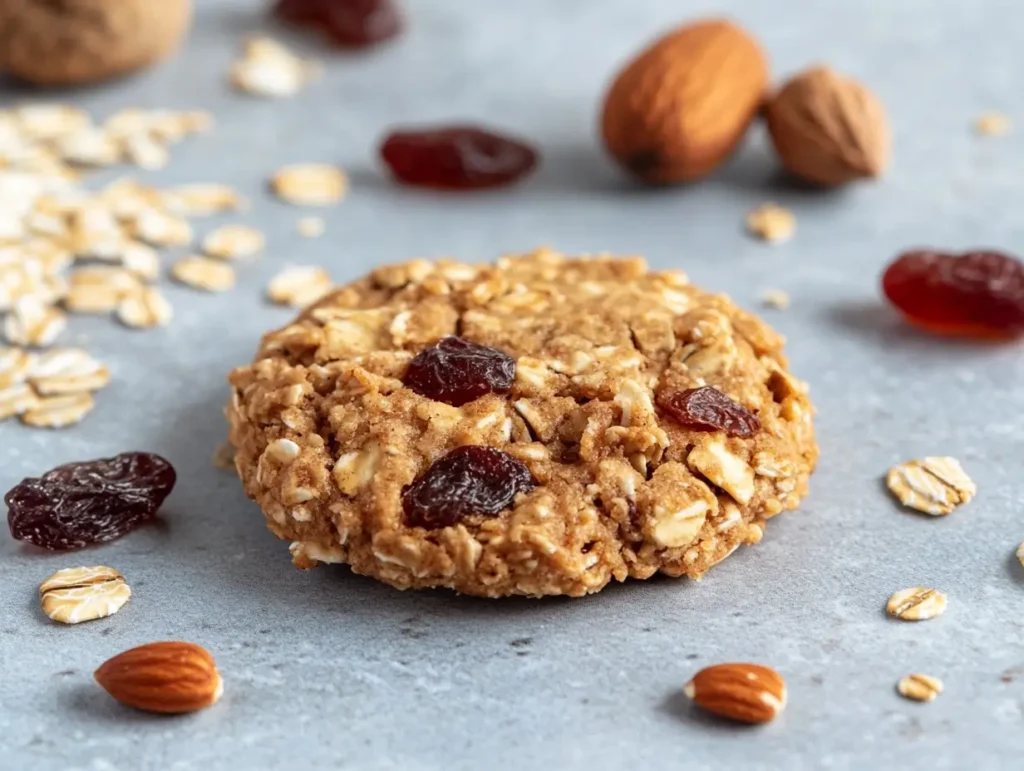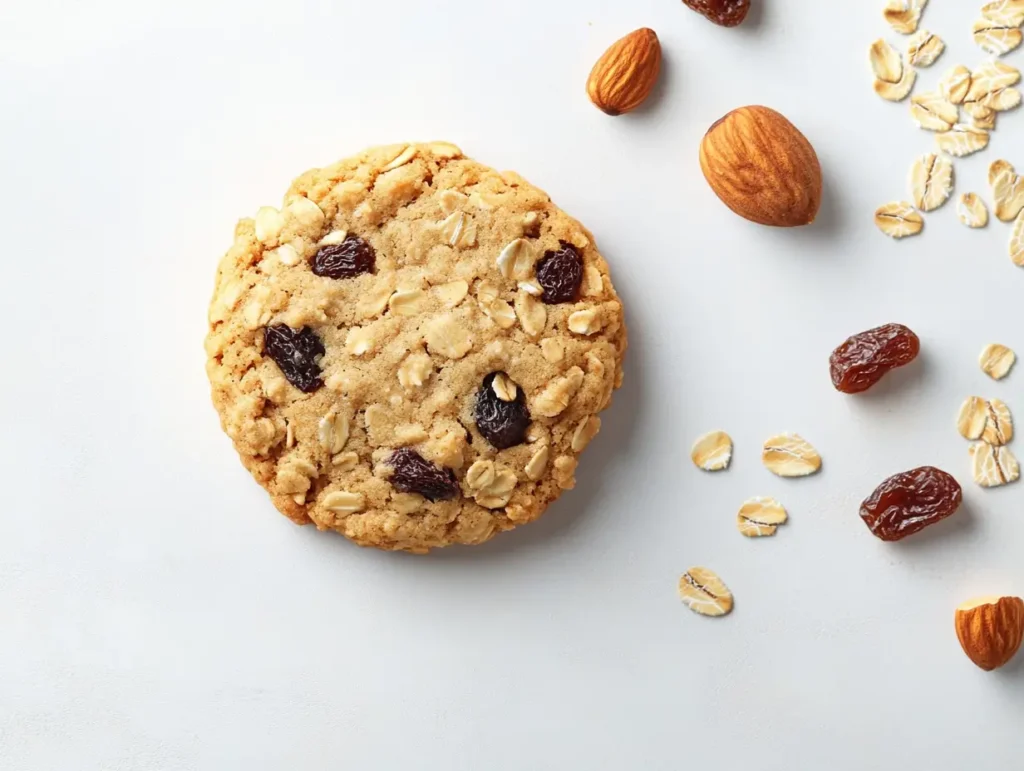Quaker Oats cookies are often considered a healthier snack, but is Quaker Oats cookie healthy enough to be part of a balanced diet? These cookies are made with oats, which are packed with fiber, vitamins, and minerals that support heart health and digestion. However, added sugars and fats in commercial versions can affect their health value. This article explores the nutrition, benefits, and ways to make healthier Quaker Oats cookies at home. Let’s find out if they truly deserve their health-food reputation!
Introduction to Quaker Oats Cookies
What Are Quaker Oats Cookies?
Quaker Oats cookies are popular baked treats made with rolled oats, offering a chewy texture and sweet flavor. These cookies often include ingredients like raisins, nuts, chocolate chips, and sweeteners, adding variety and taste. They’re marketed as nutritious because of their oat content, known for being rich in fiber and heart-healthy nutrients.
Why Consider Their Health Aspects?
Though they seem like a healthier alternative to sugar-loaded desserts, Quaker Oats cookies still contain calories, fats, and sugars. Understanding what’s inside is essential for making smarter dietary choices. Are these cookies truly good for your health, or do they fall into the “treat” category? In this article, we’ll analyze their nutritional profile, compare them to other snacks, and share tips on how to make healthier versions at home. Stay tuned for a balanced breakdown!
Nutritional Composition of Quaker Oats Cookies
Macronutrients: Carbohydrates, Proteins, and Fats
When asking “Is Quaker Oats cookie healthy?”, understanding its macronutrient breakdown is key. These cookies are carbohydrate-rich, thanks to oats, flour, and sweeteners. A typical serving provides around 20-30 grams of carbs, mostly from oats and added sugars.
Protein content is moderate, usually 2-4 grams per cookie, depending on added ingredients like nuts or seeds. While not a protein powerhouse, adding extras like peanut butter can boost its protein value.
Fats come from ingredients like butter or oil. Quaker Oats cookies contain both healthy fats (from nuts) and saturated fats (from butter), which need moderation.
Micronutrients: Vitamins and Minerals Present
Quaker Oats cookies aren’t just about carbs and fats; they also deliver essential micronutrients. Oats provide iron, magnesium, and zinc, supporting energy and immune health. Plus, raisins or nuts add vitamin E and potassium, crucial for heart health.
However, commercial versions may lack these benefits due to processing. Reading the label ensures you get cookies with nutrient-dense ingredients like whole oats and less refined sugar.
Health Benefits of Quaker Oats Cookies
Rich Source of Dietary Fiber
One of the biggest perks of Quaker Oats cookies is their fiber content. Oats are packed with soluble fiber, helping to lower cholesterol levels and promote heart health. Just one cookie can offer 1-2 grams of fiber, making it a smarter snack than typical sugary treats.
Heart Health and Cholesterol Reduction
Consuming oatmeal-based cookies may support cardiovascular health by reducing LDL cholesterol (“bad” cholesterol). The soluble fiber in oats forms a gel-like substance in the gut, which helps remove cholesterol from the body. This heart-friendly benefit makes oatmeal cookies a better choice than standard sugar cookies.
Energy and Sustained Satiety
Since oats are complex carbs, they release energy slowly, keeping you full longer. This makes Quaker Oats cookies ideal for a quick energy boost without a sugar crash. Pairing them with a protein source like Greek yogurt can enhance sustained satiety, making them a perfect post-workout snack.
Overall, if you’ve ever wondered “Is Quaker Oats cookie healthy?”, their fiber content, heart-health benefits, and energy-boosting qualities suggest they can be — as long as you eat them mindfully!

Potential Health Concerns
Added Sugars and Preservatives
When asking “Is Quaker Oats cookie healthy?”, added sugars and preservatives are critical factors. Commercially made Quaker Oats cookies often contain refined sugars and preservatives to extend shelf life. These hidden sugars can spike blood sugar levels, leading to energy crashes and potential weight gain if eaten in excess. Opting for homemade versions allows better control over sugar content.
Caloric Content and Weight Management
Quaker Oats cookies are calorie-dense, with each cookie averaging 100-150 calories. While oats are nutritious, combining them with ingredients like butter, syrup, and chocolate chips can increase caloric load. For those watching their weight, limiting portion sizes or choosing lower-calorie versions can help maintain a balanced diet.
Allergen Considerations
These cookies may also pose allergy risks due to ingredients like nuts, gluten, and dairy. People with food allergies should read labels carefully or prepare allergen-free versions at home.
For a delicious homemade alternative, check out Quaker Oatmeal Cookie Recipe on Vicky Recipes.
Comparing Quaker Oats Cookies with Other Snacks
Healthier Snack Alternatives
Compared to sugary desserts like brownies or candy bars, Quaker Oats cookies are a better option due to their fiber content and lower glycemic index. They offer a nutrient boost from oats and raisins, unlike snacks made with processed flour and refined sugar.
Where Quaker Oats Cookies Stand
However, compared to whole-food snacks like fruit or unsalted nuts, Quaker Oats cookies fall short in terms of natural sugars and healthy fats. While they’re more nutritious than many packaged sweets, they should still be treated as an occasional indulgence.
If you’re curious about baking tips, check out Why Are My Oatmeal Cookies Always Dry? for expert advice on achieving the perfect chewy texture!
How to Make Healthier Quaker Oats Cookies at Home
Choosing Healthy Ingredients
Making healthier Quaker Oats cookies at home is simpler than you might think. Swap refined sugars for natural sweeteners like honey, maple syrup, or mashed bananas. Use whole-grain oats instead of instant oats for added fiber and slower energy release. Replacing butter with coconut oil or unsweetened applesauce can lower saturated fat content while keeping cookies moist and delicious.
Recipe Customizations for Wellness
Looking to boost nutrition? Add chia seeds, flaxseeds, or nuts for extra omega-3s and healthy fats. To reduce carb load, try using almond flour or a mix of whole-wheat flour. Prefer something sweeter but still healthy? Toss in a handful of dark chocolate chips or dried fruits like cranberries or apricots.
Customizing your cookies lets you enjoy a delicious treat while staying mindful of your nutritional goals. Is Quaker Oats cookie healthy? With these adjustments, they certainly can be!
Expert Opinions and Scientific Studies
Findings from Nutritional Studies
Scientific research has long praised oats for their heart-health benefits, thanks to their soluble fiber content. Studies show that regular oat consumption can lower cholesterol levels and reduce cardiovascular risk. Quaker Oats cookies retain these benefits when made with minimal added sugars and healthy fats.
Dieticians’ Recommendations
Many nutritionists recommend oatmeal-based snacks like Quaker Oats cookies as better alternatives to sugary desserts, provided portion sizes remain reasonable. Dieticians emphasize that homemade versions with natural ingredients are the healthiest. However, processed varieties with high sugar content should be eaten occasionally.
Is Quaker Oats cookie healthy? According to experts, it depends on portion size, ingredients, and frequency of consumption. Balance is key!

FAQs
Are Quaker Oats Cookies Good for Weight Loss?
The answer to “Is Quaker Oats cookie healthy?” depends on how they’re prepared. If you’re watching your weight, Quaker Oats cookies can be a healthier treat when made with wholesome ingredients like rolled oats, nuts, and natural sweeteners. They provide fiber that keeps you full longer, helping to curb unhealthy snacking.
However, store-bought versions may contain added sugars and fats, which can lead to weight gain if eaten in large amounts. Choosing homemade recipes with controlled sugar levels and nutrient-dense ingredients makes these cookies a weight-loss-friendly snack in moderation.
Can Diabetics Eat Quaker Oats Cookies?
Diabetics often wonder if Quaker Oats cookies are safe to eat. When made with low-glycemic ingredients like oats, almond flour, and unsweetened applesauce, they can fit into a diabetes-friendly diet. The fiber in oats slows down sugar absorption, helping to stabilize blood sugar levels.
However, commercially produced cookies may be high in sugar and refined carbs, making them less suitable for diabetics. If you’re managing blood sugar, opt for sugar-free or low-carb homemade recipes. Always consult your healthcare provider for personalized advice.
Is Quaker Oats cookie healthy? It can be — if prepared thoughtfully and eaten in moderation!
Conclusion
So, is Quaker Oats cookie healthy? The answer depends on how they are made and eaten. Quaker Oats cookies can be a good snack if made with simple ingredients like oats, nuts, and natural sweeteners. They are high in fiber, which helps keep you full and supports heart health.
However, store-bought cookies often have added sugars, unhealthy fats, and preservatives, making them less healthy. Reading labels and choosing products with fewer additives is a smart move. Even better, bake your own cookies so you can control what goes in them.
In the end, Quaker Oats cookies can be healthy if you watch portion sizes and avoid overindulging. They are better than many sugary treats but shouldn’t replace fresh fruits or nuts.
Enjoy them as an occasional treat while keeping a balanced diet and active lifestyle. With the right ingredients, Quaker Oats cookies can be a tasty and nutritious snack that fits your goals. Stay mindful, and snack smart!

1 thought on “Is Quaker Oats Cookie Healthy?”